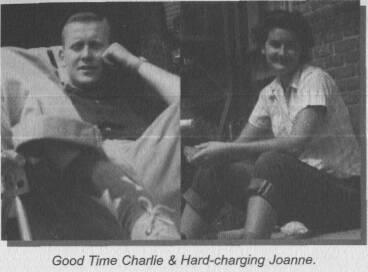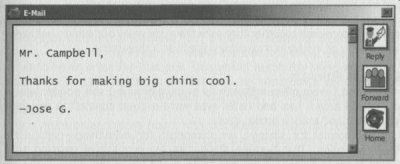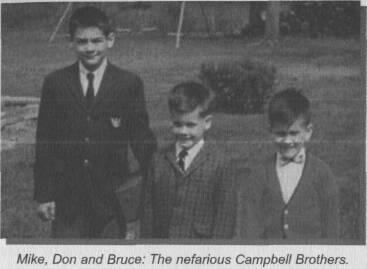If Chins Could Kill: Confessions of a B Movie Actor (2 page)
Read If Chins Could Kill: Confessions of a B Movie Actor Online
Authors: Bruce Campbell
Tags: #Autobiography, #United States, #General, #Biography & Autobiography, #Biography, #Entertainment & Performing Arts - General, #Entertainment & Performing Arts, #Actors, #Performing Arts, #Entertainment & Performing Arts - Actors & Actresses, #1958-, #History & Criticism, #Film & Video, #Bruce, #Motion picture actors and actr, #Film & Video - History & Criticism, #Campbell, #Motion picture actors and actresses - United States, #Film & Video - General, #Motion picture actors and actresses

EDITOR'S NOTE****
At that point, I left the room. What follows has been transcribed from the tape recording made in my office:
Sam Raimi: This is horse shit.
Ivan Raimi: Tell you something else, I smell a screw job.
Sam Raimi: This guy'll pay.
Ivan Raimi: Right. Like those guys at United Artists paid? Did you ever get your money outta them?
Sam Raimi: Are you absolutely sure they never paid? 'Cause when I called, they said they sent the check to you.
Ivan Raimi: Somehow, I'm not surprised. I'll tell you what we do. This time we screw them before they screw us.
Sam Raimi: High five!
Ivan Raimi: High five!
Sam Raimi: Check this out...
Ivan Raimi: Look what I got.
EDITOR'S NOTE****
The remainder of the tape had no more voices, merely the sounds of drawers opening and closing. When I returned to my office, the Raimi brothers were gone. A gold pen and an antique silver clock were missing from my desk. In addition, my cellular phone was missing. I had it disconnected the next day, but when the phone bill arrived, I noticed that more than a dozen calls had been made to a series of 1-900 numbers that day.
I leave the reader to draw his or her own conclusions. But having had the privilege of getting to know Mr. Campbell through the preparation of this book, I beg the reader not to judge his character by the quality of his friends.
-- Barry Neville, Editor, St. Martin's Press
INTRODUCTION
Genealogies appearing in book form usually begin with a great statesman, a renowned warrior, an illustrious divine, poet, author or reformer, and are so blended with fabulous detail as scarce to leave room for the supposition that the founder of the family ever had a father. Not so in this case, for the worthy progenitor of our race, first to cross the Atlantic Ocean, with whom, for lack of earlier information, our genealogy must begin, was a man of lowly origin and humble occupation...
-- Great-grandfather Hugh Campbell in 1906
So, another actor writes a book about their glamorous, whirlwind life. Personally, as an ex-Detroiter, that crap bores me to tears. I've always been more interested in the working stiffs of Hollywood, ninety-nine percent of whom are overlooked in those phony "tell-all" books. For every Bruce Willis and Steven Spielberg, there are a hundred no-name slobs scraping out a living in this shockingly difficult profession.
Therefore, this is not a memoir about what I said to so-and-so at the Beverly Hills Hotel. It's also
not
about an actor's "meteoric" rise, or "tragic" fall. Rather, this book is dedicated to the players on the second string, the "B" people, if you will, and I cheerfully include myself in that lot.
I was the first member of my immediate family to make a living in the arts. I can't say that I was the first Campbell to be published, because George John Douglass Campbell, eighth Duke of Argyll, kicked out a half dozen books in the late 1800s -- my personal favorite being
The History and Antiquities of Iona.
Great-great-great-grandfather Peter Campbell was a shepherd in Killin, Perthshire, Scotland. Tiring of that (and who could blame him?), Peter and his wife, Catherine, set sail to America in March of 1798 and eventually took up the farming life in Caledonia, upstate New York. The family became "official" in 1810, when Peter was awarded his Certificate of Citizenship.
According to family records, this man was "spare in frame, somewhat stooped, long features, solemn but pleasant countenance, with piercing black eyes and wavy black hair." An extremely pious fellow, he was a teetotaler and "endeavored by precept and example to cause others to abstain from their baneful use."
He wasn't exactly Mr. Excitement, but ol' Pete got the Clan Campbell up and going in the States.
Four generations later, my grandfather ventured westward to attend the University of Michigan as a pre-med student. World War I interrupted his studies, and Donald MacKenzie Campbell found himself serving a tour of duty in France. His father, Hugh, was a pacifist and objected to his involvement, so Donald enlisted in the ambulance corps, reasoning that he could "save lives instead of taking them." Ironically, the horrors of war outraged him so much, he transferred to the artillery division without telling his father.
After the war, which he refused to discuss, Donald changed majors and graduated from college with a degree in history -- the first in his family to do so. Right out of college, Donald landed his first and only job as a sales engineer for Alcoa Aluminum in Detroit. Forty-four years later, he retired. His marriage to childhood sweetheart Dorothy lasted almost as long -- forty-three years.
The Campbells, up until 1928, had been a serious, hardworking lot, but with the birth of Charles Newton Campbell, everything changed. Charlie didn't want to be another "Man in the Grey Flannel Suit" -- he had dreams in the late forties of becoming a painter, so when he attended the University of Michigan, it was to study art and history.
Upon graduating, his parents persuaded him to find a "real" job -- this came in the form of a billboard inspector for the Campbell/Ewald (no relation) advertising agency in downtown Detroit.
At least in advertising,
Charlie thought to himself,
I can still be creative.
Yes, my father was creative -- very creative. His territory of inspection was everything east of the Rockies, and Charlie could, in the days predating cell phones and fax machines, get anywhere via Chicago -- where he knew a cute girl.
After two years of this, Charlie moved up to the "creative" world of media buying. By all accounts he excelled -- so much so, he caught the eye of an attractive secretary across the hall named Joanne.
Joanne Louise Pickens was different than the other women Dad met at the ad agency. As a practicing Christian Scientist, she was a far cry from the hard-drinking crowd Dad hung with.
"The other women were a hell of a lot of fun," Dad recalled, "but I couldn't see myself marrying one of them."
Joanne was also unique in another way for a woman in the mid-fifties -- she was a single mom with a three-year-old son named Mike. Charlie didn't seem to mind, and a year later they married and moved into a house in the suburbs.
That's where I come in....
1
THE PROVING GROUNDS
There is an L-shaped scar on the left side of my chin. People always ask me how I got it and I've told them everything from "One dark night in Bombay," to "A scuffle with bad, bad, Leroy Brown..."
In actuality, it came about because I was a fearless kid. I played outside a great deal of the time, in any weather and in suburban Detroit, Michigan, that's saying something. In this age where laser surgery rushes to correct every imperfection, I'm not going to touch that scar -- it reminds me of too much fun.
Bilbo Baggins would have felt right at home in my neighborhood -- it was a magical place.
The Braes of Bloomfield
was created by commuters hoping to get away from the faded glory of the Motor City, and the results were impressive. As a kid exploring the woods between these upper-middle-class homes, the city might as well have been a million miles away.
Unlike the embarrassing names attributed to subdivisions today -- like "Pine Meadows," where there are neither pine trees nor meadows -- if a street in my neighborhood was called Old Orchard, it was because there used to be an orchard on that very spot. Rogue trees in many of the yards still produced apples.
With street names like Braemoor, Idlewyle, and Darramoor, you'd think you were in rural Scotland. Most of the traditional ranch-style homes weren't all that big, but they had land around them. The best part of all is that there were virtually no fences -- this was long before the "planned" communities of today, with guard gates, motion-sensitive lighting, and Neighborhood Watches.
Our neighborhood had an epic feel to it, and this broad range provoked a sense of unlimited possibility. As a result, the three Campbell boys (Mike, Don and Bruce) were "free range" and could explore at will.
I am the youngest of the three. Don is a year older. He and I wound up spending more time together than with Mike, six years our senior, but there were plenty of industrious summers spent as a threesome.
SIBLING RIVALS
Don and I were often mistaken as twins, although I still wonder why -- his reddish brown hair and hazel eyes were a great contrast to my dark brown hair and muddy brown eyes.
As is normal for siblings, we competed for everything -- particularly Mom's attention. That became obvious to me one school morning as I leaned down to buckle up my rain boots at the top of the stairs. Don saw this as the perfect opportunity to eliminate me from his world, so he planted a foot against my butt and shoved. I tumbled forward, sure of my fate, but Mom jabbed a finger into my belt loop and held me aloft just long enough to grab the railing.
This incident, no doubt, contributed to an altercation in our front yard years later. After provoking Don for some unknown reason, he chased me across our front lawn in a rage. Somewhere along my escape route, I managed to snag a screwdriver. As Don swung his fist, I raised the Phillips head and it promptly became impaled in his wrist.




